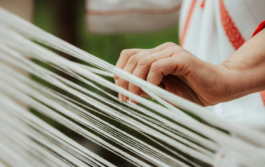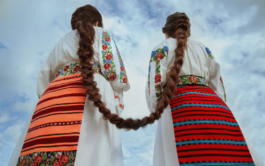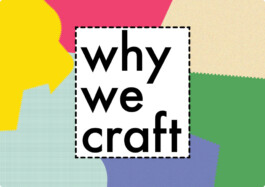Elena Neagu
A Royal Encounter
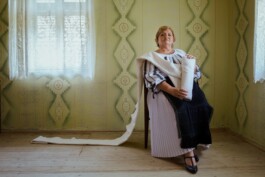
Elena Neagu's story revolves around time, divided into three stages: the past, the present, and the future. And in her story, Elena reigns like a queen honoring the past, dedicated and involved in the present, crafting the future.
In the past Elena had a hesitant relationship with tradition. Although she spent her childhood and youth close to the weaving loom, textiles became essential to her livelihood rather late. Elena was an accountant, an educator, a substitute teacher and even a foster parent before embracing her identity as craft custodian.
In 1996, an English professor doing research for his doctoral thesis on a topic related to traditional weaving devices came to Elena's village and asked her to show him how the loom works. Immersed in this experience, Elena felt a strong sense of belonging. She realized that she wanted to continue and revive a tradition on the verge of being lost. She set up her weaving and embroidery studio in an improvised workshop at her parents-in-law and started reviving old Saxon patterns and techniques, collected from elders around those parts. Rediscovering the local textile crafts by practicing them, Elena realised that “craft is not only about tradition in the strictest form, but a deep intertwining of effort, passion and inspiration”.
Her present revolves around excellence in creating textiles that fascinate with their geometry and elegance. She masters both the weaving loom and the needle. What comes out of her hands has a special energy, so special that even HRH The Prince of Wales has been a surprise guest in Elena's studio.
Thinking about the future, Elena believes that innovation in craft and appreciation of its holistic value is the way forward. After being a teacher at the Folk Art School and seeing that the girls who attended classes for three years and learned the techniques do not practice the craft anymore, Elena realized that to build a future for the youth in the village through craft, bridges needed to be built with creators from all over the world. Having built her own informal school of textile craft in the village, Elena and all the girls she mentored throughout the years are waiting for challenging opportunities to craft the future of sustainable fashion.
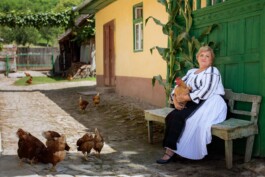
At WhyWeCraft Elena focuses on stitching (chain stitch, cross stitch, braid stitch), embroidery and lace-knitting.
Elena Neagu
A Royal Encounter

Elena Neagu's story revolves around time, divided into three stages: the past, the present, and the future. And in her story, Elena reigns like a queen honoring the past, dedicated and involved in the present, crafting the future.
In the past Elena had a hesitant relationship with tradition. Although she spent her childhood and youth close to the weaving loom, textiles became essential to her livelihood rather late. Elena was an accountant, an educator, a substitute teacher and even a foster parent before embracing her identity as craft custodian.
In 1996, an English professor doing research for his doctoral thesis on a topic related to traditional weaving devices came to Elena's village and asked her to show him how the loom works. Immersed in this experience, Elena felt a strong sense of belonging. She realized that she wanted to continue and revive a tradition on the verge of being lost. She set up her weaving and embroidery studio in an improvised workshop at her parents-in-law and started reviving old Saxon patterns and techniques, collected from elders around those parts. Rediscovering the local textile crafts by practicing them, Elena realised that “craft is not only about tradition in the strictest form, but a deep intertwining of effort, passion and inspiration”.
Her present revolves around excellence in creating textiles that fascinate with their geometry and elegance. She masters both the weaving loom and the needle. What comes out of her hands has a special energy, so special that even HRH The Prince of Wales has been a surprise guest in Elena's studio.
Thinking about the future, Elena believes that innovation in craft and appreciation of its holistic value is the way forward. After being a teacher at the Folk Art School and seeing that the girls who attended classes for three years and learned the techniques do not practice the craft anymore, Elena realized that to build a future for the youth in the village through craft, bridges needed to be built with creators from all over the world. Having built her own informal school of textile craft in the village, Elena and all the girls she mentored throughout the years are waiting for challenging opportunities to craft the future of sustainable fashion.

At WhyWeCraft Elena focuses on stitching
(chain stitch, cross stitch, braid stitch),
embroidery and lace-knitting.
Endorsed by

Powered by
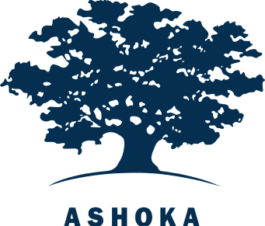
Project developed under the umbrella
of the Cultural Intellectual Property Rights Initiative®

This activity was a winner of the 2020 EU Social Innovation Competition from the European Union’s Horizon 2020 research and innovation programme.

Follow us
Our Linkedin page
Instagram Community
Our Youtube channel (soon)
© 2021-2026 Asociația WhyWeCraft, all rights reserved - WhyWeCraft®
LEARN WITH US
WORK WITH US
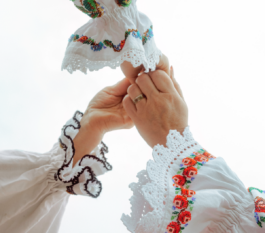
BE PART OF THE MOVEMENT FOR CULTURAL SUSTAINABILITY IN FASHION
Endorsed by

Powered by

Project developed under the umbrella
of the Cultural Intellectual Property Rights Initiative®

This activity was a winner of the 2020 EU Social Innovation Competition from the European Union’s Horizon 2020 research and innovation programme.

Follow us
Our Linkedin page
Instagram Community
Our Youtube channel (soon)
© 2021-2026 Asociația WhyWeCraft, all rights reserved - WhyWeCraft®
